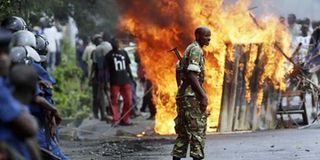Prime
Crisis Group names new Africa conflict hotspots

A soldier stands behind a fire barricade set up by demonstrators to block riot police during a face off in the Musaga district of Bujumbura, Burundi, during protests in 2015. AFP photo
The Berlin-based International Crisis Group has challenged the African Union (AU) to undertake robust reforms to empower its Peace and Security Council to leverage on conflict prevention across the continent.
In a report released yesterday, the non-profit organisation dedicated to conflict deterrence, noted that the Council has become hesitant to take bold steps after AU political leadership in December 2015 reversed its decision to deploy an intervention force to Burundi.
A failed coup and disputed elections at the time plunged the East African country in a civilian unrest, leading to the deaths of dozens.
In 2017, AU leaders rebuffed the bloc’s Peace and Security Council proposal to send troops to shield Western Sahara against Morocco, which re-joined the continental body in 2017 following a 33-year hiatus.
Peace and security
These “unfortunate” precedents, International Crisis Group’s chief executive Robert Malley noted in yesterday’s report, “could severely undercut the Peace and Security Council’s ability to assert itself in future crises”.
Mr Malley noted that incumbent heads of state and governments were more inclined to side with colleagues in trouble, undermining the necessity for governance reforms to address causes of unrest in affected countries.
Piecemeal or delayed institutional changes have stirred confusion in AU architecture due to lack of clarity on the responsibilities between AU technical secretariat, the bloc’s political leadership and regional economic communities in the event of emerging conflict.


